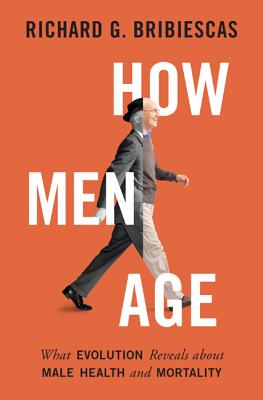

 Princeton University Press
Princeton University Press
How Men Age: What Evolution Reveals about Male Health and Mortality


Key Metrics
- Richard G Bribiescas
- Princeton University Press
- Paperback
- 9780691180915
- 8.9 X 5.6 X 0.7 inches
- 0.65 pounds
- Science > Life Sciences - Evolution
- English
 Secure Transaction
Secure TransactionBook Description
A groundbreaking book that examines all aspects of male aging through an evolutionary lens
While the health of aging men has been a focus of biomedical research for years, evolutionary biology has not been part of the conversation--until now. How Men Age is the first book to explore how natural selection has shaped male aging, how evolutionary theory can inform our understanding of male health and well-being, and how older men may have contributed to the evolution of some of the very traits that make us human.
In this informative and entertaining book, renowned biological anthropologist Richard Bribiescas looks at all aspects of male aging through an evolutionary lens. He describes how the challenges males faced in their evolutionary past influenced how they age today, and shows how this unique evolutionary history helps explain common aspects of male aging such as prostate disease, loss of muscle mass, changes in testosterone levels, increases in fat, erectile dysfunction, baldness, and shorter life spans than women. Bribiescas reveals how many of the physical and behavioral changes that we negatively associate with male aging may have actually facilitated the emergence of positive traits that have helped make humans so successful as a species, including parenting, long life spans, and high fertility.
Popular science at its most compelling, How Men Age provides new perspectives on the aging process in men and how we became human, and also explores future challenges for human evolution--and the important role older men might play in them.
Author Bio
Richard Bribiescas is Professor of Anthropology, Ecology & Evolutionary Biology and former Vice Provost for Faculty Development and Diversity. He is also a Primary Investigator in the Yale Reproductive Ecology Laboratory. His most notable research involves the evolutionary biology and endocrinology of human and comparative life histories, reproduction, aging, and metabolism. He has conducted field research among the Ache people of Paraguay as well as populations in Venezuela, Japan, Ecuador, and the United States as well as various species of non-human primates. He is presently collaborating with Professors Larry Sugiyama and Josh Snodgrass of the Department of Anthropology at the University of Oregon, as well as Professor Felicia Madimenos of the Department of Anthropology at Queen’s College CUNY on the Shuar Health and Life History Project in Ecuador.
Bribiescas received his B.A. in Anthropology and Psychology (double major) from the University of California, Los Angeles, afterwards earning an A.M. and Ph.D. in Anthropology from Harvard University. Prior to his position at Yale, he was a Post-Doctoral Research Fellow in the Reproductive Endocrine Unit of Massachusetts General Hospital in Boston. He is the author of two books; Men: Evolutionary and Life History (Harvard University Press, 2006), a comprehensive examination of the evolutionary biology of human males which was awarded the 2007 Bronze Medal in the category of science by the Independent Book Publishers Association and How Men Age: What Evolution Reveals about Male Health and Mortality (Princeton University Press, 2016), winner of the W.W. Howells Prize for best book in biological anthropology by the American Anthropological Association. In 2007, he was awarded the Medal of 600 Years Anniversary of the Restoration of the Krakow Academy by Jagiellonian University, Krakow, Poland, for his research in human reproductive ecology. In 2018 he was named an elected fellow of the American Association for the Advancement of Science (AAAS).
Professor Bribiescas serves on the editorial board of the American Journal of Human Biology and is also Associate Editor for the journal Evolution, Medicine, and Public Health. Google Scholar list can be found here.
Source: Yale University
Videos






Community reviews
Write a ReviewNo Community reviews